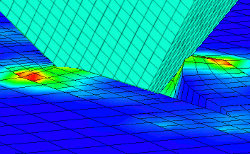 In classical macroscopic ad hoc models for the determination of contact forces in tool grinding, aspects on a microscale such as material properties including grain size and geometry as well as microscopic phenomena such as damage or cracking are modeled only in homogenized and simplified form. Applying multi-scale modeling approaches, we are able to record microscale phenomena so that the modeling accuracy can be increased significantly. The main objective of this project is to develop a multi-scale process model for tool grinding. The process model consists of a microscopic contact model for multiple abrasive grains and the tool, the coupling between the macroscopic and microscopic engagement condition for contact as well as the coupling of the microscopic contact model to the contact forces on the macroscale.
In classical macroscopic ad hoc models for the determination of contact forces in tool grinding, aspects on a microscale such as material properties including grain size and geometry as well as microscopic phenomena such as damage or cracking are modeled only in homogenized and simplified form. Applying multi-scale modeling approaches, we are able to record microscale phenomena so that the modeling accuracy can be increased significantly. The main objective of this project is to develop a multi-scale process model for tool grinding. The process model consists of a microscopic contact model for multiple abrasive grains and the tool, the coupling between the macroscopic and microscopic engagement condition for contact as well as the coupling of the microscopic contact model to the contact forces on the macroscale.
In the last funding period of the SPP1180 "Prediction and manipulation of interactions of structures and processes" the proposed project pursued four main objectives: refining the microscale contact model, using efficient discretisation and numerical schemes, extending the finite element simulation for 3D multi-body contact systems of abrasive grains and tools as well as identifying of the model parameters and integrating into the overall model and in the overall simulation.
The aim of this interdisciplinary DFG project within the SPP1480 "Modelling, simulation and compensation of thermal processing effects for complex machining processes" is the simulation of the heat input during the milling of complex geometrical shapes and the resulting thermo-mechanically induced deformations. The simulation will allow for the prediction of deviations from the desired shape of the finished surfaces in advance of the actual NC machining. Here, the focus is on the development of a hybrid simulation system that consists of a simulation tool for the milling processes and an efficient tool for the finite element computations for the thermo-mechanical deformation of the workpiece. It is crucial that both systems are coupled via a process-state-dependent crosslinking, which allows for the simulation of material removal and the heat input and output through a constantly changing situation contact between tool and workpiece.
The process dependent meshing of the workpiece is created using an octree approach that is particularly suited for the application of hp-adaptive finite element methods using tensor product shape functions. A major goal of this project is therefore to develop hp-adaptive finite element methods for linear thermoelasticity, using constrained approximation for the handling of multiple hanging nodes in the octree as well as an approximation error driven mesh refinement using projection based interpolation.
The goal of this project was to develop a software that allows simulation of crack propagation in brittle materials on the basis of a two-dimensional, linear-elastic model. The realization of the objective was the development of the XFEM approach and the implementation of basic XFEM software modules. Furthermore, this project combined the XFEM successfully with finite element methods of any higher order (p-method and hp-method) for the first time. In particular, we focused on the implementation of the XFEM approach for industrially relevant problems of geophysics.
The aim of this project is the development of preconditioners for the use of CG methods in the context of density fitting methods, which are used in the density functional theory method. Currently direct methods, based on the Cholesky decomposition techniques, are used to solve the dense systems occuring in the density fitting methods. But these are relatively memory-intensive and lead to long runtimes. Efficient iterative methods are not used due to the poor conditioning of the systems of equations in general. Structural information such as symmetries or Coulomb interactions can be used to gain preconditioners, which allows the use of CG methods for density fitting methods. The matrix vector multiplications required for the implementation of CG methods can be realized efficiently with fast multipole methods when using density fitting methods.